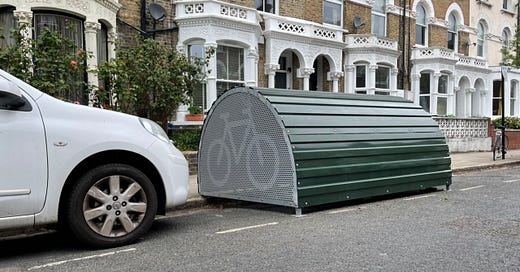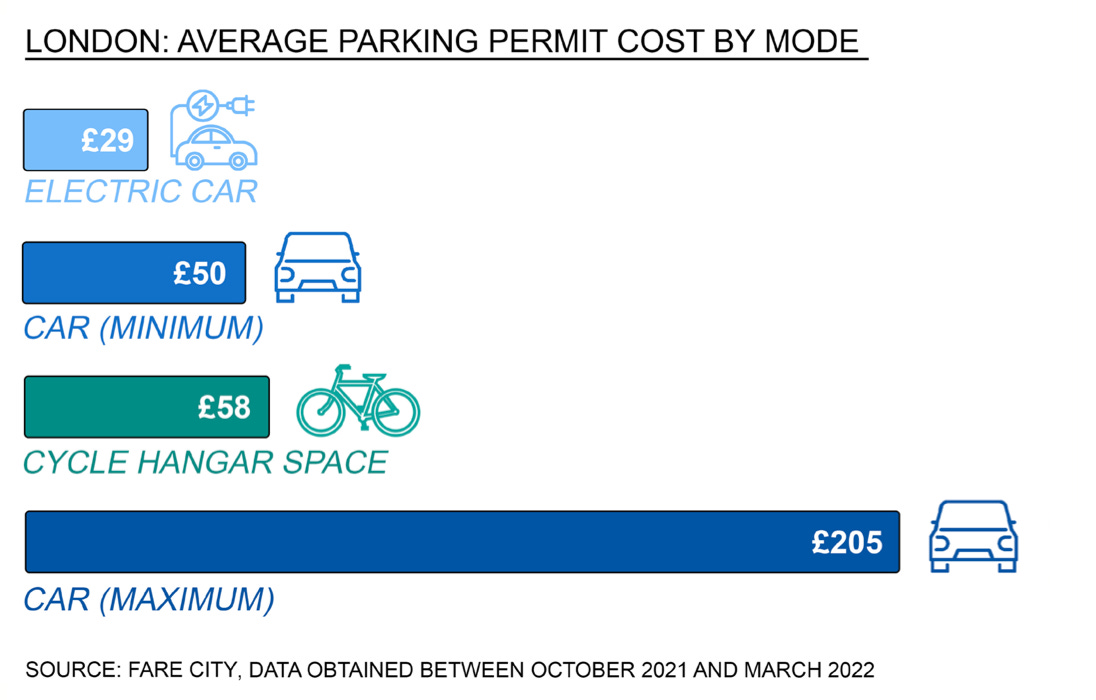The weird economics of London cycle parking
In many neighborhoods, it's cheaper to park a car than to park a bike
Hello and welcome to Oversharing, a newsletter about the proverbial sharing economy. If you’re returning from last time, thanks! If you’re new, nice to have you! (Over)share the love and tell your friends to sign up here.
This is the free edition of Oversharing. Become a paid subscriber to get two additional posts per week with the most in-depth analyses of the gig economy, mobility, and urban life; full access to the archive; and exclusive access to comments and community threads.
Cycle hangars.
The London mayor wants 80% of trips to happen by foot, cycle, or public transport by 2041. Cycling is popular in London, but one big barrier is parking. More than half of Londoners say a lack of cycle parking deters them from riding a bike, which is easy enough to understand if you’ve ever lived in a shared flat or building that lacks communal storage space, or seen a sad, broken bike frame locked up on a street. According to a report from Transport for London (TfL), 25% of Londoners who cycle and 22% who don’t are put off by fears of having their bike stolen, while 34% of theft victims said they stopped cycling—either temporarily or permanently—as a result.
One way London is investing in cycle storage is by installing ‘cycle hangars’ on residential streets. TfL uses ones from Cyclehoop that are about half the size of a parking space and hold six bikes each. The cycle hangars are wildly popular and almost impossible to get a spot in. Where I live in London, waitlists for cycle hangars range from half a dozen to more than 60 people. I recently got a spot (!!) after nearly two years on multiple waitlists but only because I spotted a new hangar being installed in my area and ‘registered interest’ for it online before it was advertised or widely noticed by the neighborhood. Shoeleather reporting! I can also say from personal experience that lack of parking is definitely what’s kept me from getting a bike to date in London; I don’t have storage space in my building, and it was clear that bikes on the street get stolen sooner or later.
In other words, cycle hangars are great and a planning no-brainer, but demand far outstrips supply. Even odder, a cycle hangar permit is often more expensive than a parking space for a regular car:
The cost of storing a bike in a hangar is five times higher than a car parking permit in some areas of London.
Only six boroughs offer bike storage at cheaper or similar rates to the cost of a permit and in 10 boroughs electric vehicles can be parked free of charge.
Cyclists can pay up to £107 for bike hangar usage annually, despite taking up much less space than drivers do.
Simon Munk from the London Cycling Campaign said that the price disparity was "discouraging" cycling in the city.
Cyclehoop told the BBC that each hangar costs £3,550 to produce, £400 to deliver, and £72 a year per space (£432 per unit) to maintain. The cost of a cycle hangar space in London varies by local council, but is on average £58 compared to an average starting cost of £50 for a traditional car and £29 for an electric car, according to Fare City.
Many London councils price their cycle spots to cover the cost of annual maintenance, but if the real goal is to get more people on bikes and out of cars, it seems obvious that this cost structure is off. To put it another way: why should the same amount of street space cost as little as £50 a year when occupied by a gas-powered car but £696 a year when taken up by two cycle hangars (12 bikes)? The street space is the same, so either it’s wildly undervalued in terms of car parking or wildly overvalued in terms of cycle parking. If your goal is to reduce car usage and increase other modes like cycling, and you know that a lot of Londoners might cycle more if they had a place to keep their bike, it seems pretty clear that you should prioritize that infrastructure, maybe by charging more for car parking permits and investing the revenue back into cycle hangars.
Pay strike.
British food delivery company Deliveroo backed off plans to cut pay and increase hours for drivers in the United Arab Emirates after they went on strike over the weekend:
The Amazon-backed company said in an email to restaurants, seen by Reuters, that it had paused proposed changes in its rider pay structure and that it would engage with its riders over the weeks and months head.
A day earlier, Deliveroo told restaurants that "riders are striking and refusing to attend their shift or deliver orders" and that it would "protect Deliveroo rider earnings to remain the most competitive in the market".
The strike reportedly brought food delivery to a “near standstill” on Sunday when many drivers refused jobs. While worker strikes are nothing new in the gig economy, they often don’t succeed or have a tangible effect on service. Delivery workers in the U.A.E. told Reuters that Deliveroo planned to cut pay by about 15% per delivery and extend shifts to 12 hours from nine. Deliveroo uses third-party agencies to staff its delivery workforce in the U.A.E. In classic fashion, Deliveroo reportedly told workers, whom it calls ‘riders,’ that the changes to pay and shifts were designed to help them maximise earnings, because gig economy companies love to tell workers that pay cuts will help them make more than ever. “Our initial intention with the announcement was to propose a more well-rounded earnings structure for agencies to engage with riders in addition to other incentives,” the company said in a statement to The National. “It is clear that some of our original intentions have not been clear and we are listening to riders.”
WFA.
Airbnb has told employees they can work from anywhere, a move that aims to maintain the flexibility office workers grew used to during our ongoing global pandemic. The company plans to standardize pay scales for U.S. and Canadian employees instead of using location-based tiers, as well as to let employees work in any of the 170 countries and regions it operates in for up to three months a year. It will create a 20-person team to figure out the payroll and tax complications, which are sure to be manifold. “It’s basically a giant paperwork nuisance and no one likes to put up with it,” CEO Brian Chesky told the Wall Street Journal, which is one of the most honest and straightforward things I’ve ever heard a CEO say.
Paperwork aside, the new policy seems like a smart move for Airbnb, which has a lot to gain from other companies following its lead and deciding to let their employees work from anywhere for a few months a year. Airbnb rebounded in 2021 and netted a $55 million profit, but business travel remains a struggle, with Chesky noting on the fourth quarter earnings call that traditional one-night business stays might never “come back the way it was before the pandemic.” Airbnb might not be able to win at short-term business stays, but if more companies adopt flexible work policies like the one it just debuted, it could very well benefit from newly liberated employees seeking a 1-3 month rental for their work-from-anywhere jaunt.
Other stuff.
At Amazon, travel money for abortion is a new corporate perk. UK ministers ditch plans to empower tech regulator. Rishi Sunak’s $1.1 billion Future Fund filled with failed bets. Bounce raises $12 million led by Andreessen Horowitz for luggage storage. Denver offering $400 rebates on e-bike purchases. Uber and Lyft to cover legal fees of drivers sued under regressive Oklahoma abortion bill. Food-delivery apps lose steam as people return to in-person dining. Uber Eats delivering groceries from 20 Tesco stores. DoorDash opens Brooklyn kitchen. Instacart shoppers feel the Instacart slowdown. Uber faces $26m fine in Australia over misleading cancellation warnings and taxi fare estimates. DoorDash extends gas aid for drivers. UK tests first full-sized autonomous bus around Edinburgh. Milan public transit agency increasing orders for electric buses. Voi using computer vision tech from Drover AI to monitor scooters on sidewalks. Baidu and Pony.ai to test driverless ride-hail service on public roads in Beijing. Softbank-backed Ola Electric to recall 1,441 e-scooters. UK may legalize private e-scooters on public roads. Bolt investing €150 million in e-bike and e-scooter operations this year. Americans embrace cargo bikes. Change to Census criteria redefining hundreds of urban areas as rural. Amazon workers reject union bid at second Staten Island warehouse. Parking Meter Monopoly Malfeasance. Uber Pet.





